Once again, I apologize for delaying the Thursday rewatch to Friday. Feel free to throw your tomatoes at leisure.
“The Bonding”
Written by Ronald D. Moore
Directed by Winrich Kolbe
Season 3, Episode 5
Production episode 40273-153
Original air date: October 23, 1989
Stardate: 43198.7
Captain’s Log: Worf is leading an away team to investigate the ruins on an uninhabited world that was home to the Koinonians, a now-extinct species that destroyed themselves in a generations-long war. There is an explosion on the surface, and Worf calls for emergency beam-up. One of the team, an archaeologist named Marla Aster, is dead on arrival, having borne the brunt of the explosion. Scans had indicated no weapons or traps.
Aster had family on board: her son, Jeremy. Her husband, Jeremy’s father, died five years previous, so the boy is orphaned.
La Forge takes an away team to the dig site to find a whole mess of mines like the one that killed Aster, all of which have inexplicably been unearthed and defused. They’re left over from the Koinonians’ lengthy war.
Worf wishes to make R’uustai with Jeremy, a Klingon bonding ceremony. Troi advises him to take it slow, and Worf instead visits with Jeremy to talk with him about his mother.
They pick up an energy signature on the planet, one which Troi senses as a presence, and which also is messing with the magnetic containment unit in engineering. As that happens, Aster appears to Jeremy—not in uniform, but in the civilian clothes she is wearing in the home videos Jeremy’s watching. She says that there was “a mistake,” and that she’s fine—and that they’ll be living on the planet below from now on. Worf arrives and is rather shocked to see Aster alive. She tries to bring him down to the planet, but Picard refuses to allow it.
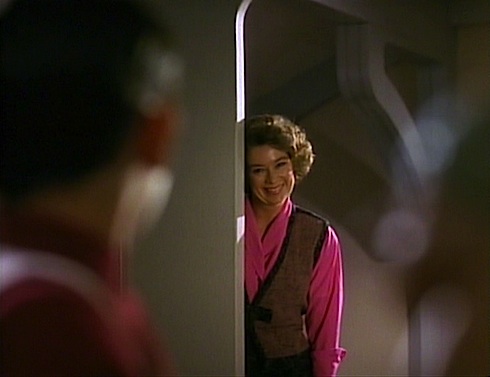
Troi takes Jeremy back to his quarters—only to find that they’ve been transformed into their old house back on Earth. The counselor confronts the false Aster, asking why she would create this fantasy; her response is that it’s what Jeremy wants, and that it is real. Even his old cat, Patches, is there.
La Forge and Data figure out a way to cut off the energy that is powering the manifestation of Aster and the re-creation of their house, but it proves to be only temporary, as the energy attacks the Enterprise, kicking O’Brien out of the transporter room, taking down two security guards, and once again manifesting both Aster and the house in the Aster quarters. Picard traps them on that deck with force fields, and goes there to confront the fake Aster.
She finally explains herself: Two species lived on the world, one of matter (the Koinonians) and one of energy (who created Aster). They re-created Marla Aster to make up for what happened. She insists that she can give Jeremy happiness and a lack of suffering—Troi asks what he’ll do for friends, an education, a career, a life, with Picard reinforcing the point that humans are mortal and must deal with death, not hide from it in memories and fantasy.
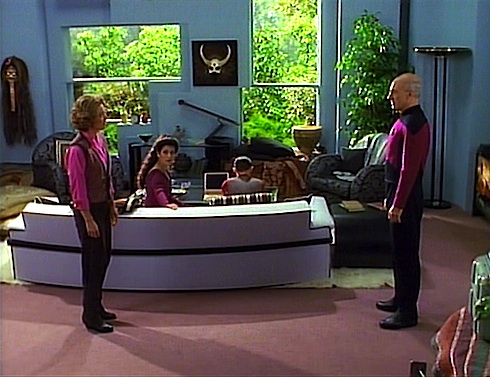
On Picard’s order, Worf brings Wes to the Aster quarters. Wes talks about the day Picard told him and Crusher about his father’s death, and how angry he was at Picard. Troi then points out that Jeremy should be angry at Worf—sure enough, the kid lashes out at Worf, asking why he came back and she didn’t.
While he can’t answer that, Worf does tell Jeremy that he, too, is an orphan. He also says that the Marla Aster he knew is not present in the cabin nor on the planet—she exists in his heart and Jeremy’s. He then proposes the R’uustai—a bonding that will make them brothers.
Seeing this, the energy being realizes that Jeremy won’t be alone and that he needs to grieve and move on, not live in the past. She disappears without a word, only a last comforting gesture to Jeremy.
In Worf’s quarters, they perform the bonding ritual, which includes a lot of lighting of candles .
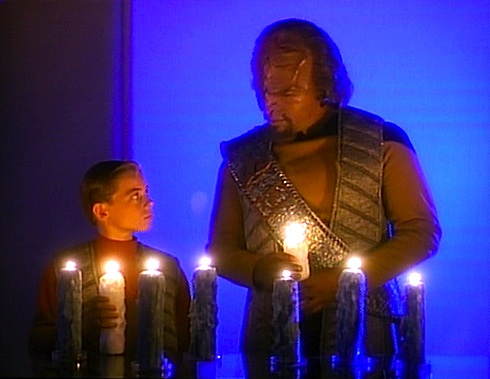
Can’t We Just Reverse the Polarity?: The mine that killed Aster has a subspace proximity detector, which renders it invisible to tricorders.
Thank You, Counselor Obvious: This is one of Troi’s better episodes, as she provides valuable guidance to Picard, Worf, Jeremy, and Wes. While en route to give Jeremy the bad news about his mother, Picard expresses his discomfort with having children on board the ship, and Troi rightly points out that not being on board wouldn’t have protected him, as he’d still have lost his mother. She also tries to get Worf to talk about what he’s dealing with, and sorta kinda succeeds.
I also particularly like Troi’s inability to focus entirely on the energy being on the surface because the emotions of the crew are too strong for her to filter them out.
The Boy!?: The events of the episode hit hard for Wes, as this reminds him a lot of what he went through when his own father died—he and his mother have a particularly powerful scene when they find themselves remembering Jack Crusher. He also gets a bit of catharsis when he finally tells Picard how angry he was at the captain years ago for ordering his father to his death.
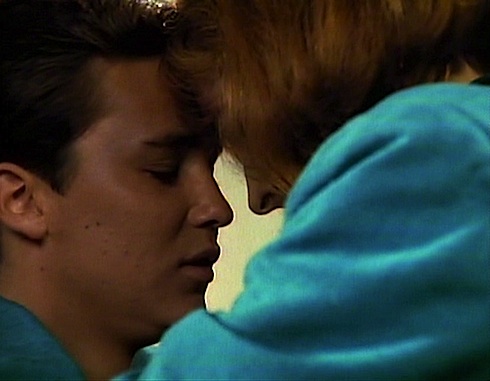
There is No Honor in Being Pummeled: Worf finally gets to lead an away team, and loses a person under his command. He struggles to deal with it, especially since, as he puts it, “I cannot take revenge against an enemy turned to dust centuries ago.” He eventually does undergo the R’uustai with Jeremy—”We have bonded and our families are stronger.”
If I Only Had a Brain…: Data tries to understand why people keep asking how well people knew Aster, as well as why grief is more keenly felt when it is a friend, specifically referencing the death of Tasha Yar.
No Sex, Please, We’re Starfleet: When Data asks Riker how well he knew Aster, he smiles and says, “We spent some time together,” which you just know is a euphemism. Wah-hey!
Welcome Aboard: Susan Powell is fantastic as Marla Aster, with subtle expressions, strong emotions, and an understated attitude. Sadly, Gabriel Damon is simply awful as Jeremy: wooden, unconvincing, robotic.
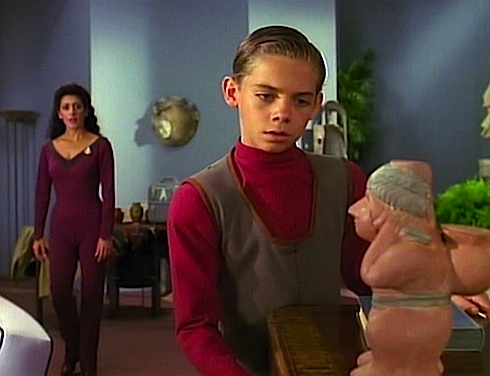
I Believe I Said That: “A leader must stand alone—as Captain Picard does.”
“Captain Picard talks to me!”
Worf trying to be stoic and Troi whupping him upside the head.
Trivial matters: This was a spec script that Ronald D. Moore submitted, and which Michael Piller—coming in late as showrunner with very few scripts—found on the slush pile. It led to Moore being made a part of the writing staff for TNG and later Deep Space Nine, eventually becoming co-executive producer of the latter show. He worked briefly on Voyager, as well, making him one of the few to work on staff for all three 24th-century series. He later went on to work on many shows, most notably as the showrunner for the acclaimed SyFy reboot of Battlestar Galactica.
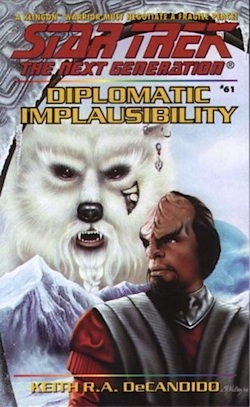
Despite being made part of Worf’s family, Jeremy was never seen or mentioned again on screen (though his mother’s death would be referenced again in “Ethics” by Riker to Worf). He did appear in a 1991 issue of DC’s Star Trek: The Next Generation comic book by Michael Jan Friedman, Peter Krause, & Pablo Marcos, as well as the TNG novels Genesis Force by John Vornholt and Diplomatic Implausibility by your humble rewatcher.
Make it So: “Her death was senseless—the last victim of a forgotten war!” Quite simply one of TNG‘s finest. Written by the best writer of modern Trek — Moore would go on to write a lot of great episodes of TNG and DS9 (not to mention co-writing two movies), all the way through to his final script for the franchise, the Voyager episode “Survival Instinct”—and the best director in Kolbe, we get a simply excellent episode.
The plot itself is fairly standard, but what makes it stand out is the spectacular character work by Moore (with some uncredited script doctoring by Michael Piller and Melinda M. Snodgrass) and the excellent visuals by Kolbe. So many brilliant scenes: Wes’s discomfort as he’s reminded of his father and just pours out his grief, first to his mother and then later to Picard; Data and Riker’s talk in Ten-Forward, filmed in intimate closeup; Picard and Troi’s solemn talk in the turbolift about children on the ship; Worf and Troi’s somewhat more contentious talk in the computer room, filmed superbly through the grating; Picard drawing out Wes’s anger; Worf’s frank talk to Jeremy, culminating in his offer to make R’uustai.
The best scene of all, though, is all Kolbe: Worf silhouetted in the background of his darkened quarters, lit only by a candle in the foreground, Worf slowly walking up to the candle holding a d’k tahg, and solemnly putting the candle out with the flat of the blade. Simply a beautiful, understated, powerful scene in an episode filled with them.
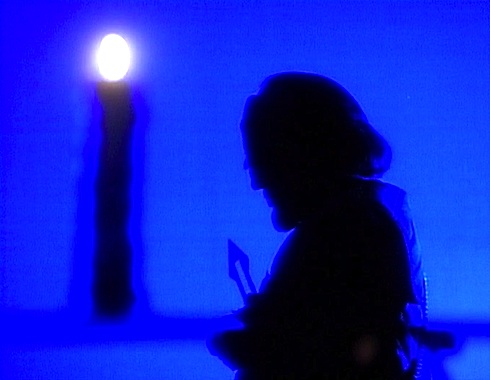
Every character moment in this episode is simply right, with not a single misstep, building beautifully on what we know of them—Data’s relationship with Yar, the death of Jack Crusher, Worf’s being orphaned, Picard’s discomfort with families on the ship, and so on. The actors rise to the occasion, too, as everyone is simply excellent—from Sir Patrick Stewart’s strong leadership all the way down to Colm Meaney, whose facial expression when the false Marla Aster enters the transporter room is just priceless.
In particular what I love about this episode is that it deals with the realities of death, and moves past the tiresome Trek cliché of the expendable redshirt. So often we’ve seen guest characters die without any thought given to who they are or even noticing or caring about them by the time the hour is over. It’s such a relief to see an episode where a member of the away team dies and it matters. After all, this is supposed to be a community of people alone in a tin can for months on end, it should really mean something when someone dies regardless of whether or not their character is listed in the opening credits.
The only flaw in the episode is the rather unfortunate casting of Gabriel Damon—who would go on to be equally wooden and stiff in RoboCop 2—as Jeremy, which takes some wind out of the story’s sails.
Still, it’s great stuff, from modern Trek‘s best.
Warp factor rating: 9
Keith R.A. DeCandido‘s first-ever Star Trek novel was Diplomatic Implausibility way back in 2001, a story which featured a cameo by Jeremy Aster ten years after this episode took place. You can get autographed copies of several of his novels and comic books directly from him. Autographed copies of the print editions of his fantastical police procedurals SCPD: The Case of the Claw and Dragon Precinct (the latter a trade reissue of the 2004 novel) are also available for preorder. Find out more about Keith at his web site, which is a portal to (among many other things) his Facebook page, his Twitter feed, his blog, and his podcasts, Dead Kitchen Radio, The Chronic Rift, and the Parsec Award-winning HG World.










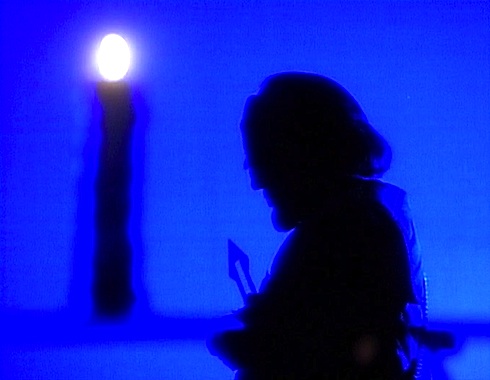
9? You are out of your mind.
I’m not as high on this episode as most people are. I liked it. All the great character moments that you mentioned I agree with. I just found a few more flaws:
1. I disagree about Susan Powell totally. I found her annoying.
2. The “ghost story” in and of itself pulls this one down, IMO. The scary part is, that it was probably executed as well as it could be, and I STILL thought it was poorly done. Ghost stories on Trek are just a bad concept, IMO.
3. I think I would have liked to have heard a thrid “testimonial” while Wesley and Worf are talking to Jermey. Yes, it was powerful, but Jack Crusher, and Worf’s parents we knew about (and Tasha Yar, too). I think it would have been great to also here from a random passenger/crewman on board, who also lost a loved one on an away mission (say, a grieving husband). It would have brought in a nice, unexpected twist, and a new story beyond the basic, IMO. This also corrects another problem of Jermey coming around too quickly, IMO.
Please don’t misread this. I did like this show. Just not as much as our reviewer did.
I did like this episode. I wouldn’t give it a nine, but at least a 7 or so. I liked the interactions between the characters and the exploration of death. I was always amused that we never see Jeremy again, even though they pretty much adopted one another.
I also noticed that Worf seems to collect more family members than any other character:
Yar: 1 Sister (Ishara from “Legacy”) and daughter(? Thanks AnnaDei but not remembering that offhand, maybe from Legacy?)
Total – 2
The Crushers: 1 Grandmother/Great-Grandmother (“Sub Rosa”), and I guess you can count Jack since we do see him in holograms and flashbacks.
Total – 2
Riker: 1 low-quality father and 1 artifical twin.
Total – 2
La Forge: We meet his parents (1 dad and 1 fake mom) and his sister (“Interface”).
Total – 3
Trio: practically a whole family (mother, father and sister flashbacks, and a child for an episode)
Total – 4
Picard: His brother’s family, a scene of his father, and an illusion of his grandmother (“Where No One Has Gone Before” – Thanks Mike S.).
Total – 5
Data: Dad, Mom, two brothers (Lore and B-4), Grandfather (“The Schizoid Man” – Thanks Scavanger), and daughter (Lal from “The Offspring” – Thanks Amir)
Total – 6
And finally, WORF:
Adoptive parents, Klingon Brother, Human Brother, Wife (well… mate), Son, and Jeremy Aster.
Total – 7
I have added the comments about the other characters’ families, but I have not added anything else to Worf, and he’s still in the lead.
If anyone thinks I missed some, let me know and I will edit and/or remove this comment. It should also be noted that I didn’t watch much DS9, so that may very well increase the numbers. Also, I didn’t include Min and little Jean-Luc for Riker from the episode “Future Imperfect” or the fake family of Picards from “The Inner Light” or “Bloodlines” since those were illusions anyway. I have included illusions that are representations of the real family member (like Picard’s father or La Forge’s mother).
Boboom: I don’t expect everyone to agree with me on everything. I like “Home Soil” more than most, I hate “Who Watches the Watchers?” with a fiery passion, and I really enjoyed the heck out of “The Royale” and “The Outrageous Okona,” for all that those are deeply flawed episodes. That’s what makes horse races, but I adored this episode from jump and still do two decades later.
Mike S.: I disagree about having some random crewmember thrown in there simply because it wouldn’t have added anything. One reason why the scene works is because it built on what we already knew about Wes and Worf, two formative aspects of characters we’ve been watching for over two years now. Having someone we don’t know or care about thrown in there wouldn’t have had anywhere near the emotional resonance and would have ultimately been pointless. And yes, Jeremy’s catharsis is a bit quick, but they do only have 42 minutes, and I honestly don’t think that Damon had the chops to pull off a longer one….
Chris of Tor.com (and everyone else): Yes, Diplomatic Implausibility had the bestest cover ever. :) It’s by Sonia Hillios and the original art is hanging proudly in my bedroom.
—Keith R.A. DeCandido
-Waiting…we also get Data’s grandfather, iirc.
@@@@@ #3 waitingshawdows:
Don’t forget Picard’s grandma (albeit in illusionary form) in “Where No One Has Gone Before.”
Tasha Yar had a daughter, and if you want to go beyond TNG, Worf also joined a new house AND got married.
How come I don’t remember this episode at all? I think I’ve got some rewatching of my own to do.
— Michael A. Burstein
I don’t really like either of the guest stars in this episode — Marla or Jeremy. But they’re the only low point in it for me.
This episode is a great example of Star Trek doing what it does best. Most of the episode is spent just seeing how the main characters are affected by death. Then, when the alien arrives to try to ease Jeremy’s pain, the crew must pull together and defend his right to mourn as an integral part of what it means to be human. As a producer, Gene Roddenberry is doing what he does best: exploring the human condition through compelling sci-fi drama. And Michael Piller is doing what he does best also: finding ways to make a story that happens to some guest stars really about the principle cast.
I have never found this episode to be anything other than crushingly boring. It’s the guest stars, mainly, although the plot doesn’t help. When you have a story so centred around a guest star, they have to be able to carry it, and they just couldn’t. Yes, it has some nice character moments, but they’re held together by boringness. Compare to The Survivors – similarly flimsy plot, but holds together incredily well because its guest stars have the ability to carry everything themselves.
@3 WaitingShadows Don’t forget The Nanny, Kahlest. Also, in that vein, looking at Memories Alpha & Beta, not only was Worf’s mother never named, but she was never even mentioned, save in a single novel. I’ll let the rest of you work out who may have written it.
I don’t know how many other people felt this way, but I found this episode incredibly painful, even more so recently when I watched it with my kids. I agree that the character development on Worf is exceptional, but the initial setup was too awful to appreciate much else of what was going on.
The notion of a parent dying, then coming back, but not really…it takes my breath away at the hurt that would cause in real life. I know, it’s just TV, and far more terrible things happen, but everyone has a trigger — and this one is mine.
I also cried my way through The Lovely Bones (the book) because the little boy loses his sister, then his mother leaves the family. I suppose the ending was supposed to be cathartic, but I was still upset about the lonely little boy from 200 pages earlier…
I may have soured on Ron Moore a bit thanks to the excesses of Battlestar Galactica — I think he tried too hard to be the anti-Trek there and sometimes that meant throwing the good out with the bad — but thinking about “The Bonding” reminds me of just how good he could be at his best. I may not have cared much about the Asters, but the character work with the regulars was really top-notch. I remember how refreshed I was that they finally did something with Wesley’s feelings about his father and Picard. That potential had been sitting there for over two years and hardly anything had been done with it. It was also good to see a side of Worf that wasn’t just about being a “warrior,” and that built on his backstory and the ways it gave him an unexpected link to Wesley.
And yes, it’s a terrific episode for Deanna as well. I read once that the reason the writing of Deanna got better from the third season onward was because the show gained writers who’d actually been in therapy and understood how it worked. And she certainly fit well into Michael Piller’s philosophy of approaching every story from the standpoint of “How does this affect our characters?”
Cradok: Actually, Worf’s mother was mentioned in one episode, and it was this very one — at the end, Worf speaks the words “SoS jiH batlh SoH,” which he tells Jeremy honors their mothers.
And yeah, that was me who finally gave the poor woman a name. *laughs* Kaasin, named after Elisa Kassin, who was, at the time that I wrote The Art of the Impossible, the editorial assistant in Simon & Schuster’s Star Trek office.
—Keith R.A. DeCandido
WaitingShadows @3:
Don’t forget Data’s “daughter”!
(The Offspring, Season 3)
It was an OK episode, and nicely reflective, but I can’t help wondering at a grieving twelve year old boy being left to live alone in his empty quarters and fend for himself after the death of his only parent. Surely he should have been fostered, or minded, or something?
Not a bad episode, but I routinely flip past this one during reruns.
I like any episode where the antagonist-of-the-week is an alien who means well instead of being simply malevolent or at best, curious and uncaring.
The Marla Astor impostor-alien tries to do the right thing out of a profound sense of guilt over something that her species wasn’t even responsible for. Eventually it took an explanation and exploration of the human condition to convince her to “give up the ghost,” as it were. I like that. A lot.
Anyone else freaked out by all the creepy masks in the recreated Aster home? Look at the shot Chris expertly chose of Troi, Picard and the Asters, center and left. Donnie Darko freaky! No wonder the kid is wooden, scared stiff, haunted by nightmares!
Not a bad episode, but you can’t really do an exploration of the emotional impact of death using characters you’ve never met before and never will again. It said something that the regular cast thinking about long-ago deaths was much more emotionally involving than the effect of the actual death that had just happened on the cardboard boy who’d just been bereaved, and that would probably have happened even if Jeremy hadn’t been entirely devoid of any visible emotions, far more so than Brent Spiner’s Data ever is.
I’m afraid I kept comparing it to the searing Buffy episode The Body and boy oh boy did it ever come up short, in just about every department. The emotional impact of death is the sort of fundamental human thing that you can make stunning (and nearly unwatchably intense) art out of if you do it right. This episode didn’t, and I’m not sure any episode could, while bound in TNG’s strictly episodic straitjacket.
Did anyone else catch the supreme irony of this episode, that one of the parties of a generations long war was named the “Koinonians”? Koinonia being anglicized Greek for the concepts of community, fellowship, sharing, intimate paticipation.
I really didn’t care for the episode. I got a vibe of “your mom died, get over it kid.”
This is probably the weakest episode of the Third Season.
Warp Factor 2.
“It’s such a relief to see an episode where a member of the away team dies and it matters. After all, this is supposed to be a community of people alone in a tin can for months on end, it should really mean something when someone dies regardless of whether or not their character is listed in the opening credits”.
I absolutely agree with this, and this is how I felt when I first watched this episode. I wish they had done this more during the show. That said, it’s a decent one, but in no way a masterpiece like a “9” would indicate. More like a 6 for me.
@@@@@ Ser Tom: That is an excellent observation sir!
Thanks for your summary. This aired the fall after my dad was killed in the line of duty as a police officer (I was 7). We didn’t watch it then, and even now, when Wesley realizes what Picard is going to do, I still have to shut it off.
I didn’t remember this episode at all, so I went back and watched it. And while I mostly agree with the synopsis, I had a little more to say.
I think the kid’s wooden acting works. It’s part of the character. He’s holding all his emotions inside. He’s trying to act all proper. And then he’s extremely skeptical when his mom comes back.
I’m not saying he’s a good actor. The woodenness probably is bad child acting. And there are a couple scenes where it doesn’t work (when he hugs his mom and seems to believe her–though he gets less wooden once she leaves). But it mostly works really well, and I think it’s good casting.
In fact, in the scene where Worf talks to him, the Klingon is the one that seems off. I know it’s to portray how awkward this sort of thing is for him, but I don’t think he had to sound mean. Especially since the script didn’t acknowledge it.
All this said, I do think the episode is weirdly shot in a way I don’t like. I understand the somber pacing is deliberate, but I think they could have punched it up a bit. They don’t get to the mother coming back until well past halfway through. And, because of this, you get a feeling of aimlessness until this happens. They could still go slow while this plot complication in earlier.
Furthermore, I while I think the mom does the motherly scenes well, she’s less believable when she’s having the conversation with Picard. Wil Wheaton was a better actor. handling the different emotions. And she doesn’t have the “child actor” excuse.
So, despite not agreeing with your main flaw, I think the episode deserves a lower score, maybe a 7 or so. Still a good episode, but not that good.
Both of the “Asters'” acting was artificial and wooden. I think the boy’s was an intent to express grief but it simply came off as wooden. The way the regulars discuss the issue of death was very good but both guest actors were awful. 5 or 6 at best.
I like that this episode features an alien struggling to understand the confusing but actually consistent behavior of the crew of the Enterprise regarding an ethical issue when it’s usually the other way around.
This episode is one of my favorite Troi vehicles. Her guidance is totally on point and i think the true potential of her character really shines through here. It’s a shame that so many people choose to ignore her high points, she is a better supporting character then a central one but isn’t that sort of the point of her role? Worf was also pretty great here but that’s not really any big surprise at this point. I think it’s great seeing the actors (other then Stewart and Spiner) really start to hit their strides with their roles.
Oh and that kid nearly derailed the episode for me, the scene where picard is telling him about his mother’s death was just painful to watch. It was a good episode though, i’m not sure i’d give it a 9 but still….
I too am surprised by the high score for this episode but I respect how everyone has their own opinions! I too found it a bit boring and as others have mentioned the quality of the guest stars was lacking and that was a big reason for my general ambivalence as well. I did like the character moments for the characters I do actually care about like the Crushers still grieving their husband/father, Worf angry about losing a member of his away team and wanting to adopt the now motherless-boy, Picard’s burden of informing Jeremy, and Troi showing her considerable chops as ship’s counselor. And it’s cool to see that this is where it all started for Ron Moore’s Trek career and beyond.
Excellent episode; the kind that really cements for me that TNG is my show more than TOS was.
I liked the episode for the reasons stated, but I wouldn’t rate it as high. An 8, at max.
I don’t like the ‘oh, I just create everything out of thin air’ aliens, and we had quite a lot of them, lately.
Yes, there are the Q, but I think a race like this should be the exception, not the rule.
It’s nice that the aliens aren’t evil, they’re genuinely distraught about the accidental death of crew woman Aster and want to make amends that’s all. It would probably have been better if they’d contacted the Enterprise and ASKED what they could do rather than going with their instincts.
I love that during the ceremony in Worf’s quarters, you can hear strains of Jerry Goldsmith’s Klingon theme from STTMP! :)
9 is an insane overrating of a good, not great episode. But then, I give We’ll Always Have Paris and The Royale a 9 so to each their own I guess.
I fully agree with the favourable assessment of this episode, although I would have given it an 8 at max. Usually I’m not interested in stories about children, especially in SciFi, but I was really captivated by this one. I don’t think that Gabriel Damon was awful as Jeremy, his somewhat ‘robotic’ behaviour reflects his emotional state very well. Speaking of children, this is one of the very few episodes where I didn’t think Wesley Crusher to be annoying.
Maybe a nitpick (and maybe I’m missing a point somewhere?) — but somehow, that R’uustai ceremony with all those candles looked far too tame. I realize that it wouldn’t be appropriate to have an actual blood-letting ritual involving an innocent kid, but this is KLINGON, dammit, not Haight-Ashbury. Having seen Worf extinguishing that candle with the dagger earlier, I expected it to play some part in the ritual itself — some kind of a blood-brotherhood bonding. Again, probably not feasible for a family show in prime time, but I wish there could have been a way to make things look at least a little bit more Klingon-like.
As for Gabriel Damon, I couldn’t get the sacrilegious notion out of my head that he was basically channeling Will Robinson.
@37/jazzmanchgo: I dunno, I like it that not every single Klingon ritual falls into the blood-and-pain cliche. If it’s all the same, it makes them a shallower, less believable culture. Real cultures get their influences from many facets of their history, and different traditions from different nations and cultures can blend together. Absolute uniformity of culture is bad worldbuilding.
(38) ChristopherLBennett — Good point! This is why I like these exchanges — we’re all challenged to look at things from new and varied perspectives!
I really loved the computer core set! I’m guessing they needed it for something else, that’s why we don’t see it again after season 3 I believe. Such a shame because it really was cool looking.
Is this the first time we get to see a Klingon D’k tahg (even though it isn’t named)?
@41/David: No, that knife design was originally created for The Search for Spock.
42: Thanks. I thought it was something else Moore brought to the ST universe.
@43/David Sim: Even if the knife had been introduced here, writers don’t design props. That would’ve been the job of the art department, most likely Rick Sternbach. In fact, according to the Star Trek Encyclopedia, TNG didn’t have access to the original ST III prop, so Rick Sternbach recreated it for “The Bonding” based on a trading card photo. (The original designer of the d’k tahg for ST III was Phil Norwood.)
I’m a little surprised at the high rating, as this was largely a dud for me. But I’d give the kid actor a bit of a break. It’s a lot to ask of a young actor to portray the complex feelings of losing a mother much less losing her and then having her come back to life, only to have the ship’s counselor, captain and others all tearing him away from her again.
Krad mentioned the Troi/Worf scene filmed through the grate, which I enjoyed. That is some artful camera work and coordination among crew and cast. At one point I think you can see Sirtis glance down for her mark, as she needed to be positioned perfectly for her to be framed through the grate.
I liked how the aliens actually behave in an alien manner, which is pretty rare in Trek. They clearly understand human suffering, yet their behavior is extremely bizarre. They believe they found a perfect solution for Jeremy, yet their understanding of the situation is so simplistic that they can’t even fathom why the Enterprise is fighting them.
So many great scenes and nice touches. Riker pointing out that the aliens offer Jeremy everything while the Enterprise offers the cold reality of his mother’s death. in that scene, Beverly also subtly turns toward Wesley’s duty station.
it’s also great how Deanna dismantled the aliens’ ridiculous plan. It’s not some clever rhetorical trickery, it’s simple reasoning
Definitely great Deanna work here. She counsels Worf, Jeremy, Picard, Wesley, and even the aliens.
Just a small note of interest, Gabriel Damon was the voice of Littlefoot in Don Bluth’s 1988 animated film The Land Before Time. Surprised nobody had mentioned it above so I’m adding it here.
Very nice episode, but I agree with the general feel that it was slightly overrated by the humble rewatcher. I give it a compelling 6.5
I feel bad for Jeremy, of course, but crew deaths and how they affect family is totally something we should see happening on the ship.
Okay, I’ve had this memory of a kid, which I assumed when this episode began to be Jeremy, mimicking Worf’s stoic Klingon nature to get through a traumatic period and even wearing a (mock) Starfleet uniform. I could be conflating memories of this and, later, Alexander but in my head it’s a human kid amidst exactly this kind of story. Weird how that can happen. Not as weird as Jeremy apparently being left to live alone in his quarters immediately after his sole parent died, I grant you…
I found myself imagining this episode as a spark for / precursor to the Worf & Troi relationship, colored by hindsight.
@48/Arben: You could be conflating the later TNG episode “Hero Worship” with this one. In the latter episode, a young boy traumatized by his family’s deaths bonds with Data and styles his hair and dresses (not in a uniform but similar colors) like Data.
The episode largely failed for me, and it wasn’t because the child actor was wooden. Actually, that’s how I am when in shock/grief; no outward affect, everything tightly kept inside so I can stay functional. I mean, maybe it WAS bad acting, but for me it worked in this case — he wasn’t ecstatic when his “mother” returned because he was old enough to find that quite suspect, even if he wanted to desperately believe it.
The episode failed primarily because Marla and Jeremy were nothing to me. You’ve really got to kill somebody off, and make somebody grieve who matters to me — if there’s more time I can come to care sufficiently about strangers, but that time isn’t there in a TV episode. You have to show me how this sort of thing affects crew about whom I already care. But not like this. It it all became a battle between my emotional attachment to Worf and Wes, and my intellectual concern for the young kid left alone in his quarters, with Picard acting as if the kid should damn well move on; it’s our lot to suffer, so get to it. I wanted to tell Worf to sit down and shut up, that making it all about himself was egotistical, and that a scary stranger with weird-ass rituals was maybe not the best person to confront the kid at this time. That ritual was what, lighting some candles, getting a sash, and learning a Klingon phrase? Didn’t feel particularly Klingon or meaningful, and indeed, since we never hear about Jeremy again, it really wasn’t. Wes, while better, was really too old — and again, it served to help Wes in his own journey, about which I care, but Jeremy was basically chopped liver on a sofa while Wes let out his anger at Picard. I felt more and more sorry for the kid, and alien-Marla seemed almost like a better deal than these cold crew members, at least for a couple of weeks petting a cat and wallowing in memories with weird masks on the walls wouldn’t be so bad. Ease into the acceptance that now you’re an orphan and will get dumped at the nearest starbase because these people are strangers and will remain so.
I wish I could like Deanna better now that she’s actually getting to do work for which she is qualified. But she always sounds fake to me, like she got her counseling degree from a fly-by-night school that advertises on the back of dime novels, and if she were my only option as a counselor, I’d rather do calisthenics with Worf (I hate exercise). Guinan is so much better at this job.
I liked that the alien lifeform wasn’t hostile, wanted to do the right thing, and could be reasoned with. I found the lack of curiosity of the crew strange, and the delay in communicating stupid, but I guess we had to drag the story out with “exciting” action instead of getting to the fun stuff (for me) — how to communicate human nature to a different life form.